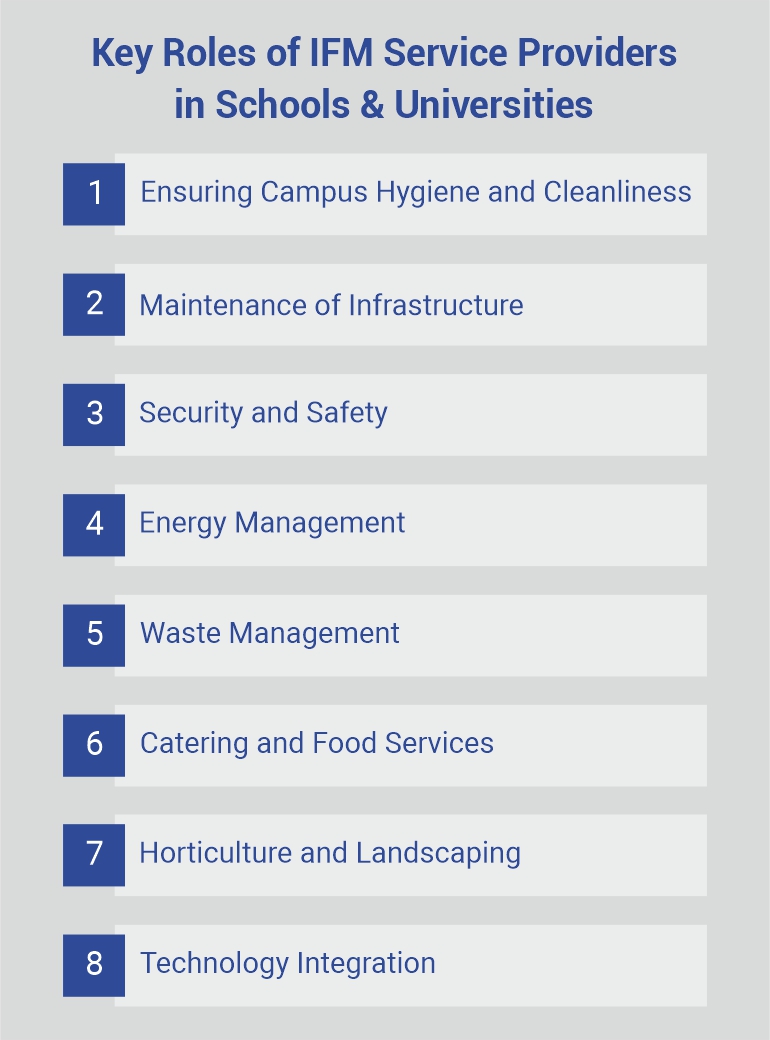Introduction :
Education is a cornerstone of India’s progress, with schools and universities playing a pivotal role in shaping the nation’s future. Beyond delivering quality education, these institutions must provide safe, clean, and conducive environments for students and faculty. Managing such environments requires a comprehensive approach that includes housekeeping, maintenance, security, and more. This is where Integrated Facility Management (IFM) service providers step in, offering holistic solutions tailored to the unique needs of educational institutions.
The Need for IFM in Schools & Universities
Schools and universities in India are more than just learning centers—they are complex ecosystems. With sprawling campuses, hostels, libraries, sports facilities, and cafeterias, managing these spaces is a daunting task. Challenges like limited budgets, rising operational costs, and maintaining compliance with safety and hygiene standards make it imperative to adopt professional facility management services.
Key Roles of IFM Service Providers

1. Ensuring Campus Hygiene and Cleanliness:
Hygiene is paramount, particularly in schools and universities where the health of students is a top priority. IFM providers implement mechanized housekeeping solutions, utilizing advanced cleaning equipment and eco-friendly products. This includes regular cleaning of classrooms, washrooms, laboratories, and auditoriums, ensuring a germ-free environment.
2. Maintenance of Infrastructure:
Educational institutions require well-maintained infrastructure to support uninterrupted learning. IFM providers handle preventive and corrective maintenance of electrical systems, HVAC units, plumbing, and IT infrastructure. This ensures operational continuity and minimizes downtime, enhancing the overall experience for students and staff.
3. Security and Safety
The safety of students and staff is non-negotiable. IFM providers offer end-to-end security solutions, including CCTV surveillance, biometric access control, and trained security personnel. These measures deter unauthorized access, prevent vandalism, and create a secure environment conducive to learning. Additionally, IFM teams ensure fire safety compliance, including regular drills and maintaining fire extinguishers, alarm systems, and emergency exits.
4. Energy Management
With increasing energy costs and growing awareness of sustainability, energy management is critical for educational institutions. IFM providers assess energy consumption patterns and implement cost-effective strategies, such as LED lighting, solar panels, and efficient HVAC systems. These measures not only reduce utility bills but also align with the global push for greener campuses.
5. Waste Management:
Waste generation is a common concern in schools and universities, from paper waste to food and electronic waste. IFM providers establish robust waste management systems, including segregation at source, recycling, and disposal of hazardous materials. They also run awareness campaigns to encourage students and staff to adopt eco-friendly practices.
6. Catering and Food Services
With hostels and cafeterias integral to educational institutions, food safety is a priority. Institutional Food Catering services providers ensure the availability of nutritious, hygienic meals prepared in compliance with food safety standards. Regular audits and feedback mechanisms further enhance the quality of services.
7. Horticulture and Landscaping
A well-maintained campus with green spaces fosters a positive and serene atmosphere. IFM providers manage horticulture and landscaping, ensuring lawns, gardens, and open spaces are aesthetically pleasing and well-maintained. This also contributes to better air quality and noise reduction, enhancing the learning environment.
8. Technology Integration
Modern campuses require technological support for day-to-day operations. IFM providers implement tech-driven solutions like Building Management Systems (BMS), digital attendance, and compliance dashboards. These technologies streamline operations, improve accountability, and enable data-driven decision-making.
Benefits of IFM for Schools and Universities
1. Focus on Core Activities:
By outsourcing facility management tasks, schools and universities can focus on their core mission of delivering quality education. This allows administrators to channel their energy into academic and extracurricular excellence instead of operational concerns.
2. Cost Efficiency:
IFM providers optimize resource utilization, reducing operational costs. Their expertise in vendor management, procurement, and energy-saving initiatives ensures that institutions get value for money while maintaining high service standards.
3. Scalability and Flexibility:
Educational institutions often face fluctuating requirements due to events, admissions, or seasonal changes. IFM providers offer scalable solutions, adjusting manpower and resources based on the institution's needs.
4. Compliance with Regulations:
Schools and universities in India must adhere to various safety, hygiene, and labor regulations. IFM providers ensure compliance with these standards, minimizing the risk of penalties and enhancing the institution's reputation.
Case Study: The Impact of IFM in Indian Schools
A renowned school in Gurugram faced challenges managing its growing campus, including inconsistent housekeeping, rising energy costs, and inadequate security measures. Partnering with FFServices, one of the top facility management companies they successfully transformed their operations.
- Mechanized cleaning systems improved hygiene standards.
- Energy audits resulted in a 20% reduction in electricity bills.
- Advanced security solutions enhanced safety, reassuring parents and staff.
This collaboration allowed the school to focus on delivering superior education while achieving operational excellence.
Challenges and Solutions
1. Budget Constraints:
Educational institutions often operate within tight budgets. IFM providers address this by offering customized solutions, prioritizing essential services, and implementing cost-saving strategies.
2. Resistance to Change:
Transitioning to IFM services may face resistance from existing staff. Effective communication, training, and gradual implementation help overcome this barrier, ensuring a smooth transition.
3. Varied Needs across Institutions:
The needs of schools differ from those of universities. IFM providers conduct detailed assessments to tailor their services, ensuring relevance and effectiveness.
Future of IFM in Indian Educational Institutions
The demand for IFM services in schools and universities is set to grow as institutions increasingly recognize the value of professional facilities management. Emerging trends like IoT, AI-driven maintenance, and sustainable practices will redefine the role of IFM providers.
Conclusion:
In India, where education is a priority, the role of Integrated Facility Management service providers in schools and universities is indispensable. By ensuring clean, safe, and efficient environments, IFM providers enhance the educational experience, support operational efficiency, and contribute to the overall development of students. As institutions strive for excellence, partnering with IFM providers is not just an option—it is a necessity.
Incorporating IFM services is a step towards building world-class educational facilities that empower India’s youth to achieve their full potential. Contact us for your tailor-made IFM requirements.
Industries we serve:
Automobile | Manufacturing | Pharmaceutical | Oil and Gas | Healthcare | Ancillary | FMCG | Education | Real Estate | Commercial | Mining | Hotels
Also read: Data-Driven Decision-Making in Facility Management

